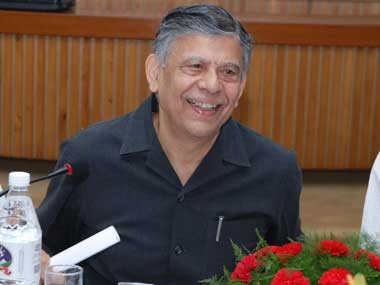Terming the Kelkar Committee’s “reform scenario” fiscal deficit target of 5.2 percent as “extremely ambitious” and “aggressive”, brokerages have said the target is unlikely to be met as the government may not reduce its subsidy expenditure further.
Espirito Santo Securities has said the threat of a downgrade of India’s sovereign ratings “is at best postponed rather than eliminated”.[caption id=“attachment_481854” align=“alignleft” width=“380”]  Chairman of 13th Finance Commission, Vijay Kelkar. Image courtesy PIB[/caption]
While the brokerage estimates the fiscal deficit to be at 5.8 percent of GDP, Deutsche Bank sees it at 5.7 percent.
A more optimistic 5.5 percent is possible only if the government is able to exceed its disinvestment targets and 2G spectrum targets.
The government targets Rs 30,000 crore from disinvestment and Rs 40,000 crore from 2G spectrum.
“… We do not expect a savings from plan expenditure of more than Rs 20,000 crore in FY12/13. We expect total subsidies to be higher by about Rs 40,000 crore, mainly on account of fuel subsidies, where we estimate a slippage of approximately Rs 30,000 crore,” Deutsche Bank said in a note.
The slippage in fuel subsidies is inevitable as the government has already exhausted 91 percent of budgetary provision.
Even the recent price increases and limiting of subsidy in LPG may help oil companies contain their under-recoveries at last year’s level of Rs 1.3 lakh crore, the bank said, adding it estimates the fuel subsidy at Rs 67,000 crore.
The subsidy will overshoot the budget target of Rs 30,000 crore, even if the government pays only half of this. Add to this the food and fertiliser subsidy, for which the slippages are seen Rs 5,000 crore each, the Deutsche Bank note said.
“If the Centre opts for a sharp cut in plan expenditure (to 10% YoY from a budgeted 22%)-which is obviously not good for supply-side and hence growth-there will be room to accommodate the burgeoning subsidy bill and rising interest payments,” Espirito Santo noted.
However, it expects an increase in subsidy bill to 2.6 percent of GDP, as none of the recommendations of the Kelkar Committee is likely to be implemented given the political sensitivity of the steps due to the upcoming state elections and the delicate political scenario.
On revenue shortfall, Deutsche Bank concurs with the Kelkar panel’s overall estimates of Rs 30,300 crore for reform scenario, but differs on composition.
While according to the panel the entire revenue slippage will be on account of tax collection shortfall, the bank sees the shortfall from tax at Rs 20,000 crore and that from disinvestment at Rs 10,000 crore.
Espirito Santo, however, expects the government to overshoot the disinvestment target as it sees a likely modification in the sale mechanism to make it more effective. It expects the government to realise only half of its targeted 2G auction revenue.
The brokerage sees a total receipts growth of 14.4 percent, which is in line with the panel’s estimates in a “no-reform scenario”.


)
)
)
)
)
)
)
)
)



